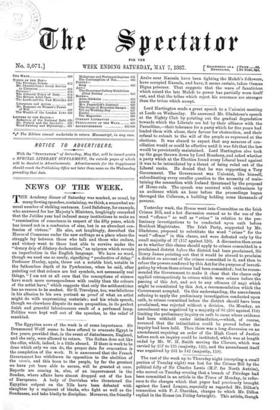Yesterday week, the House went into Committee on the Irish
Crimes Bill, and a hot discussion ensued as to the use of the word " offence " as well as " crime " in relation to the pre- liminary investigations to be conducted upon oath before Resident Magistrates. The Irish Party, supported by Mr. Gladstone, proposed to substitute the word "crime" for the word " offence" in this clause, and were defeated only by the small majority of 37 (157 against 120). A discussion then arose as to whether this clause should apply to crimes committed in a proclaimed district before the district had been proclaimed, Sir Henry Tames pointing out that it would be absurd to proclaim a district on account of the crimes committed in it, and then to refuse the powers conferred by this Act for the purpose of investi- gating by whom those crimes had been committed; but he recom- mended the Government to make it clear that the clause only applied retrospectively to crimes which were crimes before the passing of this Act, and not to any offences (if any) which might be constituted by this Act, a recommendation which the Government accepted. On this understanding, the amendment refusing to apply the preliminary investigation conducted upon oath, to crimes committed before the district should have been proclaimed, was rejected without a division. On Monday, an amendment was negatived by a majority of 96 (206 against 110) limiting the preliminary inquiry on oath to cases where evidence had been withheld under intimidation,—which, of course, assumed that the intimidation could be proved before the inquiry had been held. Then there was a long discussion on an amendment requiring an order of the High Court of Justice before such an inquiry could be instituted, which was at length ended by Mr. W. H. Smith moving the Closure, which was carried by 257 to 135 (majority, 122), and the amendment itself was negatived by 261 to 142 (majority, 119).


































